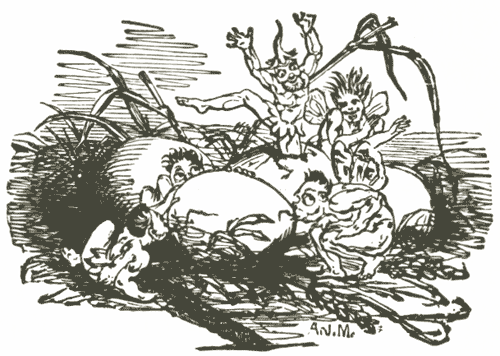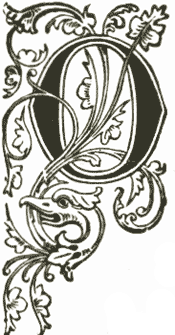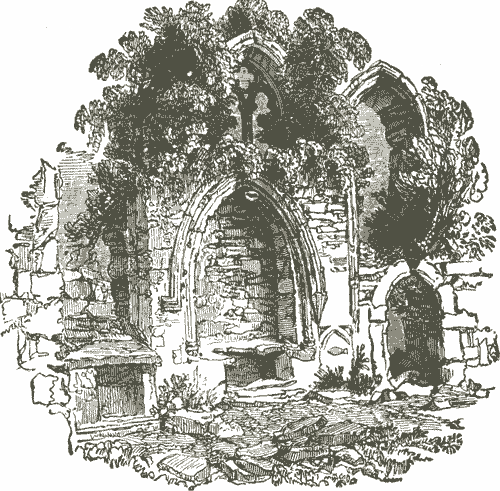The Lady of Gollerus - Fairy Legends of Ireland


N the shore of Smerwick harbour, one fine summer's morning, just at daybreak, stood Dick Fitzgerald "shoghing the dudeen," which may be translated, smoking his pipe. The sun was gradually rising behind the lofty Brandon, the dark sea was getting green in the light, and the mists clearing away out of the valleys went rolling and curling like the smoke from the corner of Dick's mouth.
" 'Tis just the pattern of a pretty morning," said Dick, taking the pipe from between his lips, and looking towards the distant ocean, which lay as still and tranquil as a tomb of polished marble. "Well, to be sure," continued he, after a pause, " 'tis mighty lonesome to be talking to one's self by way of company, and not to have another soul to answer one—nothing but the child of one's own voice, the echo! I know this, that if I had the luck, or maybe the misfortune," said Dick, with a melancholy smile, "to have the woman, it would not be this way with me! and what in the wide world is a man without a wife? He's no more surely than a bottle without a drop of drink in it, or dancing without music, or the left leg of a scissors, or a fishing-line without a hook, or any other matter that is no way complete. Is it not so?" said Dick Fitzgerald, casting his eyes towards a rock upon the strand, which, though it could not speak, stood up as firm and looked as bold as ever Kerry witness did.
But what was his astonishment at beholding, just at the foot of that rock, a beautiful young creature combing her hair, which was of a sea-green colour; and now the salt water shining on it appeared, in the morning light, like melted butter upon cabbage.
Dick guessed at once that she was a Merrow, although he had never seen one before, for he spied the cohuleen driuth, or little enchanted cap which the sea people use for diving down into the ocean, lying upon the strand near her; and he had heard that, if once he could possess himself of the cap she would lose the power of going away into the water: so he seized it with all speed, and she, hearing the noise, turned her head about as natural as any Christian.
When the Merrow saw that her little diving-cap was gone, the salt tears—doubly salt, no doubt, from her—came trickling down her cheeks, and she began a low mournful cry with just the tender voice of a new-born infant. Dick, although he knew well enough what she was crying for, determined to keep the cohuleen driuth, let her cry never so much, to see what luck would come out of it. Yet he could not help pitying her; and when the dumb thing looked up in his face, and her cheeks all moist with tears, 'twas enough to make any one feel, let alone Dick, who had ever and always, like most of his country, men, a mighty tender heart of his own.
"Don't cry, my darling," said Dick Fitzgerald; but the Merrow, like any bold child, only cried the more for that.
Dick sat himself down by her side, and took hold of her hand by way comforting her. 'Twas in no particular an ugly hand, only there was a small web between the fingers, as there is in a duck's foot; but 'twas as thin and as white as the skin between egg and shell.
"What's your name, my darling?" says Dick, thinking to make her conversant with him; but he got no answer; and he was certain sure now, either that she could not speak or did not understand him: he therefore squeezed her hand in his, as the only way he had of talking to her. It's the universal language; and there's not a woman in the world, be she fish or lady, that does not understand it.
The Merrow did not seem much displeased at this mode of conversation; and making an end of her whining all at once, "Man," says she, looking up in Dick Fitzgerald's face, "Man, will you eat me?"
"By all the red petticoats and check aprons between Dingle and Tralee," cried Dick, jumping up in amazement," I'd as soon eat myself, my jewel! Is it I eat you, my pet? Now, 'twas some ugly ill-looking thief of a fish put that notion into your own pretty head, with the nice green hair down upon it, that is so cleanly combed out this morning!"
"Man," said the Merrow, "what will you do with me if you won't eat me?"
Dick's thoughts were running on a wife: he saw, at the first glimpse, that she was handsome; but since she spoke, and spoke too like any real woman, he was fairly in love with her. 'Twas the neat way she called him man that settled the matter entirely.
"Fish," says Dick, trying to speak to her after her own short fashion; "fish," says he, "here's my word, fresh and fasting, for you this blessed morning, that I'll make you Mistress Fitzgerald before all the world, and that's what I'll do."
"Never say the word twice," says she; "I'm ready and willing to be yours, Mister Fitzgerald; but stop, if you please, till I twist up my hair." It was some time before she had settled it entirely to her liking; for she guessed, I suppose, that she was going among strangers, where she would be looked at. When that was done, the Merrow put the comb in her pocket, and then bent down her head and whispered some word to the water that was close to the foot of the rock.
Dick saw the murmur of the words upon the top of the sea, going out towards the wide ocean, just like a breath of wind rippling along, and, says he, in the greatest wonder, "Is it speaking you are, my darling, to the salt water?"
"It's nothing else," said she, quite carelessly; "I'm just sending word home to my father not to be waiting breakfast for me; just to keep him from being uneasy in his mind."
"And who's your father, my duck?" said Dick. "What!" said the Merrow, "did you never hear of my father? he's the king of the waves to be sure!" "And yourself, then, is a real king's daughter?" said Dick, opening his two eyes to take a full and true survey of his wife that was to be. "Oh, I'm nothing else but a made man with you, and a king your father; to be sure he has all the money that's down at the bottom of the sea!"
"Money," repeated the Merrow, "what's money?"
" 'Tis no bad thing to have when one wants it," replied Dick; "and may be now the fishes have the understanding to bring up whatever you bid them?"
"Oh! yes," said the Merrow, "they bring me what I want."
"To speak the truth then," said Dick, " 'tis a straw bed I have at home before you, and that I'm thinking, is no ways fitting for a king's daughter; so if 'twould not be displeasing to you just to mention a nice feather bed, with a pair of new blankets—but what am I talking about? may be you have not such things as beds down under the water?"
"By all means," said she, "Mr. Fitzgerald—plenty of beds at your service. I've fourteen oyster-beds of my own, not to mention one just planting for the rearing of young ones."
"You have?" says Dick, scratching his head and looking a little puzzled. " 'Tis a feather-bed I was speaking of; but, clearly, yours is the very cut of a decent plan to have bed and supper so handy to each other, that a person when they'd have the one need never ask for the other."
However, bed or no bed, money or no money, Dick Fitzgerald determined to marry the Merrow, and the Merrow had given her consent. Away they went, therefore, across the strand, from Gollerus to Ballinrunnig, where Father Fitzgibbon happened to be that morning.
"There are two words to this bargain, Dick Fitzgerald," said his Reverence, looking mighty glum. "And is it a fishy woman you'd marry? The Lord preserve us! Send the scaly creature home to her own people; that's my advice to you, wherever she came from."
Dick had the cohuleen driuth in his hand, and was about to give it back to the Merrow, who looked covetously at it, but he thought for a moment, and then says he, "Please, your Reverence, she's a king's daughter."
"If she was the daughter of fifty kings," said Father Fitzgibbon, "I tell you, you can't marry her, she being a fish."
"Please your Reverence," said Dick again, in an under tone, "she is as mild and as beautiful as the moon."
"If she was as mild and as beautiful as the sun, moon, and stars, all put together, I tell you, Dick Fitzgerald," said the Priest, stamping his right foot, "you can't marry her, she being a fish!"
"But she has all the gold that's down in the sea only for the asking, and I'm a made man if I marry her; and," said Dick, looking up slily, "I can make it worth any one's while to do the job."
"Oh! that alters the case entirely," replied the Priest; "why there's some reason now in what you say: why did'nt you tell me this before? marry her by all means, if she was ten times a fish. Money, you know, is not to be refused in these bad times, and I may as well have the hansel of it as another, that may be would not take half the pains in counselling you that I have done."
So Father Fitzgibbon married Dick Fitzgerald to the Merrow, and, like any loving couple, they returned to Gollerus well pleased with each other. Everything prospered with Dick—he was at the sunny-side of the world; the Merrow made the best of wives, and they lived together in the greatest contentment.
It was wonderful to see, considering where she had been brought up, how she would busy herself about the house, and how well she nursed the children; for, at the end of three years there were as many young Fitzgeralds—two boys and a girl.
In short, Dick was a happy man, and so he might have been to the end of his days if he had only had the sense to take care of what he had got; many another man, however, beside Dick, has not had wit enough to do that.
One day, when Dick was obliged to go to Tralee, he left his wife minding the children at home after him, and thinking she had plenty to do without disturbing his fishing tackle.
Dick was no sooner gone than Mrs. Fitzgerald set about cleaning up the house, and chancing to pull down a fishing-net, what should she find behind it in a hole in the wall but her own cohuleen driuth. She took it out and looked at it, and then she thought of her father the king, and her mother the queen, and her brothers and sisters, and she felt a longing to go back to them.
She sat down on a little stool and thought over the happy days she had spent under the sea; then she looked at her children, and thought on the love and affection of poor Dick, and how it would break his heart to lose her. "But," says she, "he won't lose me entirely, for I'll come back to him again, and who can blame me for going to see my father and my mother after being so long away from them?"
She got up and went towards the door, but came back again to look once more at the child that was sleeping in the cradle. She kissed it gently, and as she kissed it a tear trembled for an instant in her eye and then fell on its rosy cheek. She wiped away the tear, and turning to the eldest little girl, told her to take good care of her brothers, and to be a good child herself until she came back.
The Merrow then went down to the strand. The sea was lying calm and smooth, just heaving and glittering in the sun, and she thought she heard a faint, sweet singing, inviting her to come down. All her old ideas and feelings came flooding over her mind, Dick and her children were at the instant forgotten, and placing the cohuleen driuth on her head she plunged in.
Dick came home in the evening, and missing his wife he asked Kathelin, his little girl, what had become of her mother, but she could not tell him. He then inquired of the neighbours, and he learned that she was seen going towards the strand with a strange looking thing like a cocked hat in her hand. He returned to his cabin to search for the cohuleen driuth. It was gone, and the truth now flashed upon him.
Year after year did Dick Fitzgerald wait expecting the return of his wife, but he never saw her more. Dick never married again, always thinking that the Merrow would sooner or later return to him, and nothing could ever persuade him but that her father the king kept her below by main force; "For," said Dick, "she surely would not herself give up her husband and her children."
While she was with him she was so good a wife in every respect that to this day she is spoken of in the tradition of the country as the pattern for one, under the name of THE LADY OF GOLLERUS.

